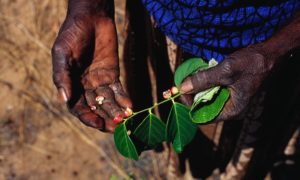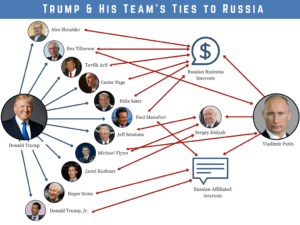Saturday, March 11th, 2017
David Robson, Feature Writer - BBC (U.K.)
Stephan: In 1962 I spent about two weeks in the Kalahari Desert with the Kung Bushmen in what is now Namibia. The experience changed my life because it forced me to recognize that there are a lot of ways to be a human being, and with different perspectives one lives in a different world. I consider it one of the most important lessons I have ever learned.

The Himba people of Namibia can see fine details and ignore distraction much better than most other human beings – a finding that may reflect the many ways that modern life is changing our minds and abilities.
Credit: BBC
Nestled in a grassy valley of north-western Namibia, Opuwo may seem like a crumbling relic of colonial history. With a population of just 12,000, the town is so small that it would take less than a minute to drive from the road sign on one side of town to the shanty villages on other. Along the way, you would see a hotchpotch collection of administrative offices, a couple of schools, a hospital and a handful of supermarkets and petrol stations.
For many of the people living in the surrounding valley, however, this small town is also the first taste of modern life. The capital of the Kunene region, Opuwo lies in the heartland of the Himba people, a semi-nomadic people who spend their days herding cattle. Long after many of the world’s […]
No Comments
Saturday, March 11th, 2017
Melissa Davey, - The Guardian (U.K.)
Stephan: And finally for today's special edition, here is the latest on the place of Aboriginal people in the history of Australia.

DNA collected from hair samples in the 1900s has revealed a continuous connection to regions of Australia going back thousands of years.
Credit: Richard I’Anson/Lonely Planet Images
A study of ancient Aboriginal hair samples has revealed distinct Aboriginal populations were present in Australia with little geographical movement for up to 50,000 years.
The discovery of such a long, continuous presence in the those regions emphasized why land was so sacred to Aboriginal people, researchers said.
The results emerged after researchers led by the University of Adelaide’s Australian centre for ancient DNA analysed the mitochondrial DNA from 111 hair samples collected during anthropological expeditions in the early to mid-1900s. The samples are stored at the South Australian Museum.
Mitochondrial DNA is the powerhouse that drives the conversion of food into energy, and is useful to researchers because it carries genetic material passed exclusively between a mother and her children, allowing maternal ancestry to be traced.
Despite the age of the hair samples and the fact that they were collected under harsh environmental conditions, the researchers were surprised to find high […]
No Comments
Steve Hanley , - Clean Technica
Stephan: Here is some more good news about solar. Trump and his minions may do what they can to impede the transition out of carbon energy to protect the interests of some of their big donors, but the trend is more powerful and the conversion is underway.

Solar power is now the least expensive source of electricity on average in 58 emerging economies around the world, according to Bloomberg New Energy Finance. Why is that important? Many of those countries are part of the developing world, places where, until recently, people have been living in conditions barely more advanced than feudal times.
Energy is what allows human beings to perform deeds that exceed what is possible by using muscle power alone. It builds cities, establishes transportation networks, and creates wealth. Until the advent of the internet, billions of people were blissfully unaware of the modern world. No more. Now that those people know what is possible, they want to share in the blessings of an advanced society — now, not generations in the future.
China is the perfect example. After World War II, it awoke from its own feudal dream and aspired to join the world’s leading nations. To make that happen, it built hundreds of coal-fired electrical generating facilities. Today, the US has less than a dozen cities with more than one million inhabitants. China has 106 and is building more every day.
India is anxious to replicate China’s success. Until recently, it […]
No Comments
Representative Eric Swalwell (D-CA), - Homepage Representative Eric Swalwell
Stephan: Several readers have written me saying that in all the noise about President Trump and the Russians they have found it impossible to actually get a clear sense of the real substance of the issue, and could I please find some reliable information about who and what is involved.
As it turns out the best source I could find was the home page of a California Congressman, Democratic Representative Eric Swalwell. Here it is, and it checks out. This situation is unprecedented and, I think, Americans have good reason to be concerned.

Credit: Rep. Eriic Swalwell
Despite Russia’s harmful national interests against the U.S., and its human rights violations around the world, President Trump and his team are directly and indirectly tied to Russia.
Throughout the 2016 presidential election, President Trump not only refused to criticize Russian President Vladimir Putin, but was even friendly and accommodating in his remarks. In his own words, President Trump called President Putin “highly respected.” More recently, President Trump put the U.S. on equal moral footing with Russia when responding to Bill O’Reilly’s question about Putin being a “killer,” saying “We’ve got a lot of killers… you think our country’s so innocent?” This is absolutely false moral equivalence, and unheard of for the President of the United States to insult and demean the country he leads.
President Trump has harshly criticized NATO, and exclaimed that only the NATO allies that paid equally to the alliance deserved protection from the United States. Though these remarks were softened by British Prime Minister Theresa May, who claims that President Trump fully supports the North Atlantic […]
1 Comment
Damian Carrington, - Reader Supported News/The Guardian
Stephan: It is a dogma of the chemical-based mono-culture industrial agriculture model that you must uses poisons to control pests and weeds. That is the only way to create a system that can feed the world. It is a dogma and like most dogmas it has no actual factual basis, only ideological belief.

Glyphosate spraying
The idea that pesticides are essential to feed a fast-growing global population is a myth, according to UN food and pollution experts.
A new report, being presented to the UN human rights council on Wednesday, is severely critical of the global corporations that manufacture pesticides, accusing them of the “systematic denial of harms”, “aggressive, unethical marketing tactics” and heavy lobbying of governments which has “obstructed reforms and paralysed global pesticide restrictions”.
The report says pesticides have “catastrophic impacts on the environment, human health and society as a whole”, including an estimated 200,000 deaths a year from acute poisoning. Its authors said: “It is time to create a global process to transition toward safer and healthier food and agricultural production.”
The world’s population is set to grow from 7 billion today to 9 billion in 2050. The pesticide industry argues that its products – a market worth about $50bn (£41bn) a year and growing – are vital in protecting crops and ensuring sufficient food supplies.
“It is a myth,” said Hilal Elver, the UN’s special rapporteur on […]
1 Comment















